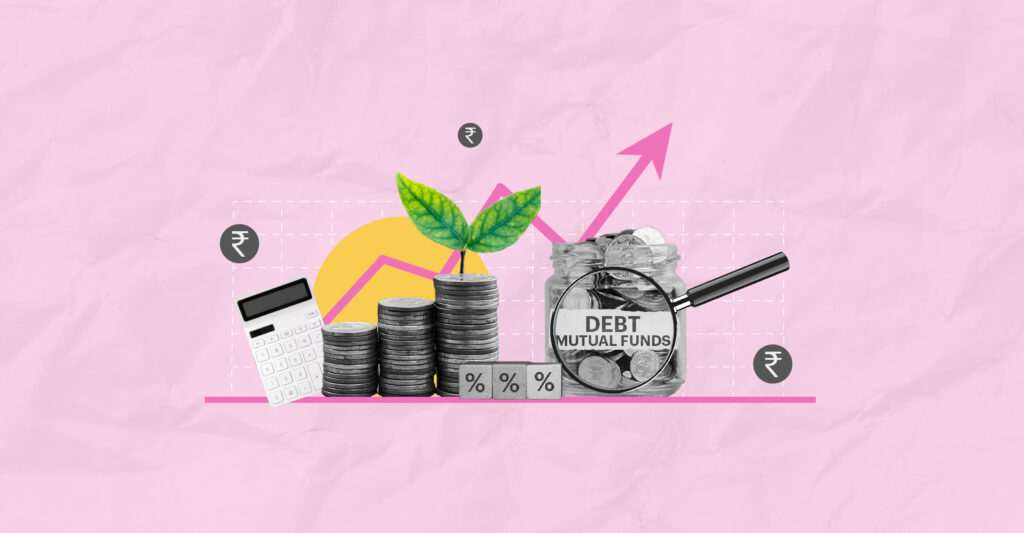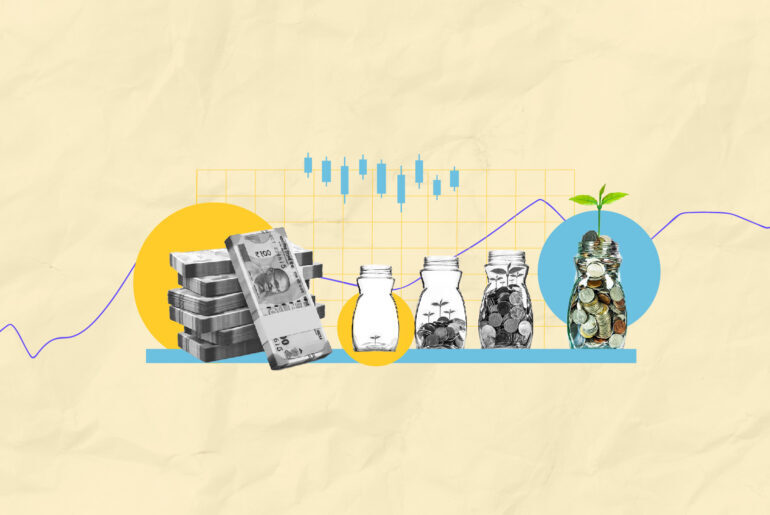Last Updated on Jul 30, 2024 by Anjali Chourasiya
Table of Contents
Best debt mutual funds in 2024 – Based on 5-yr CAGR
| Name | Sub-Category | AUM (Rs. in cr.) | Expense Ratio (%) | CAGR 5Y (%) |
| Nippon India Nivesh Lakshya Fund | Long Duration Fund | 6,348.08 | 0.30 | 9.23 |
| Aditya Birla SL Medium Term Plan | Medium Duration Fund | 1,890.60 | 0.87 | 9.02 |
| DSP G-Sec Fund | Gilt – Short & Mid Term Fund | 592.28 | 0.54 | 8.85 |
| SBI Magnum Gilt Fund | Gilt – Short & Mid Term Fund | 7,195.93 | 0.46 | 8.84 |
| Bandhan G-Sec-Invest | Gilt – Short & Mid Term Fund | 1,453.46 | 0.62 | 8.75 |
| ICICI Pru Constant Maturity Gilt Fund | Gilt – Long Term Fund | 2,195.83 | 0.23 | 8.67 |
| Kotak Gilt Fund | Gilt – Short & Mid Term Fund | 2,387.71 | 0.42 | 8.67 |
| Kotak Gilt Fund-PF&Trust | Gilt – Short & Mid Term Fund | 2,387.71 | 0.42 | 8.67 |
| Edelweiss Government Securities Fund | Gilt – Short & Mid Term Fund | 137.62 | 0.49 | 8.65 |
| Bandhan G-Sec-Constant Maturity Plan | Gilt – Long Term Fund | 302.98 | 0.29 | 8.62 |
Note: The list of debt mutual funds is derived from Tickertape Mutual Fund Screener and is as of 1st October 2023. The parameters used to curate the list are as follows:
- Category: Debt
- Plan: Growth
- CAGR 5Y: Sort from highest to lowest
Top debt mutual funds – Based on low expense ratio
| Name | Sub-Category | AUM (Rs. in cr.) | Expense Ratio (%) |
| Nippon India Inv-Qrtly-III | Debt – Interval Fund | 42.6711 | 0.02 |
| Aditya Birla SL Inv Inc-QS I | Debt – Interval Fund | 69.3028 | 0.02 |
| Nippon India Inv-Mthly-I | Debt – Interval Fund | 4.1973 | 0.03 |
| Franklin India Credit Risk Fund | Credit Risk Fund | 0 | 0.04 |
| Franklin India Dynamic Accrual Fund | Dynamic Bond Fund | 0 | 0.04 |
| Franklin India Low Duration Fund | Low Duration Fund | 0 | 0.04 |
| Franklin India ST Income Plan | Short Duration Fund | 408.9495061 | 0.04 |
| Axis Overnight Fund | Overnight Fund | 8017.9014 | 0.05 |
| Nippon India Inv-Qrtly-I | Debt – Interval Fund | 2.736 | 0.05 |
| Nippon India Inv-Annual-I | Debt – Interval Fund | 15.7176 | 0.05 |
Note: The list of debt mutual funds is derived from Tickertape Mutual Fund Screener and is as of 1st October 2023. The parameters used to curate the list are as follows:
- Category: Debt
- Plan: Growth
- Expense Ratio: Sort from lowest to highest
Less volatile debt funds in India (2024)
| Name | Sub-Category | AUM (Rs. in cr.) | Expense Ratio (%) | Volatility (%) | 3Y Avg Rolling Returns (%) |
| Bajaj Finserv Overnight Fund | Overnight Fund | 71.51 | 0.08 | 0.01 | 0.00 |
| Invesco India Overnight Fund | Overnight Fund | 300.34 | 0.06 | 0.01 | 4.03 |
| JM Overnight Fund | Overnight Fund | 126.59 | 0.07 | 0.01 | 103.55 |
| PGIM India Overnight Fund | Overnight Fund | 90.50 | 0.11 | 0.01 | 4.07 |
| Edelweiss Overnight Fund | Overnight Fund | 818.23 | 0.11 | 0.01 | 4.02 |
| LIC MF Overnight Fund | Overnight Fund | 587.60 | 0.07 | 0.01 | 4.02 |
| Baroda BNP Paribas Overnight Fund | Overnight Fund | 677.18 | 0.09 | 0.01 | 4.03 |
| Union Overnight Fund | Overnight Fund | 302.87 | 0.08 | 0.01 | 4.00 |
| Tata Overnight Fund | Overnight Fund | 2646.28 | 0.06 | 0.01 | 4.02 |
| Sundaram Overnight Fund | Overnight Fund | 1278.68 | 0.09 | 0.01 | 3.99 |
Note: The list of debt mutual funds is derived from Tickertape Mutual Fund Screener and is as of 1st October 2023. The parameters used to curate the list are as follows:
- Category: Debt
- Plan: Growth
- Volatility: Set to Low – Sort from lowest to highest.
The term debt doesn’t need an introduction; it means loan. Debt mutual funds are a scheme which pools money from investors. This money is used to purchase debentures or bonds issued by public, private or government entities. Hence, when you invest in debt mutual funds, you indirectly give these entities loans. As it majorly deals with debt instruments that earn a fixed interest rate, the risk is lower than equity mutual funds. Now that we have lists of debt mutual funds based on various parameters, let’s learn more about debt funds and their taxation.
Taxation on debt mutual funds as per the Union Budget 2024-2025
The debt mutual funds taxation as per the new rules of Budget 2024 is as follows:
Short-Term Capital Gains (STCG)
If you sell your debt fund units within three years (36 months), the gains from these investments are considered short-term capital gains. According to the new budget, these gains will be taxed according to your income tax slab rate.
Long-Term Capital Gains (LTCG)
For debt funds held for over three years (36 months), the gains are categorized as long-term capital gains. The key points to note under the new budget are:
- Tax Rate: The tax rate for long-term capital gains on debt funds is now a flat 12.5%, regardless of the amount of gain.
- No Indexation Benefit: The benefit of indexation, which previously allowed investors to adjust the purchase price of their assets for inflation, has been removed for debt funds. This means that the entire gain from selling a debt fund after three years will be taxable at the flat rate of 12.5%.
Summary
| Capital Gains Tax | Description |
| Short-Term Capital Gains (STCG) | If you sell your debt fund units within three years (36 months), the tax will be as per your income tax slab. |
| Long-Term Capital Gains (LTCG) | For debt funds held for over three years (36 months), the tax rate is now a flat 12.5% without indexation benefits. |
Equity funds vs debt funds
Equity and debt funds are two popular types of mutual funds. The difference between these funds is where the money is invested. Equity funds invest primarily in equity shares and related securities. While debt funds invest in debt securities.
Conclusion
Apart from debt funds, there are several other mutual fund types available in the market. Irrespective of the fund type, you need to understand your investment objective and risk appetite. Find the scheme that aligns with your objectives.
Use Tickertape Mutual Fund Screener to filter the best mutual funds in India based on 50+ filters. Not just that, using Tickertape’s Mutual Fund Portfolio, you can also keep an eye on the performance of the funds.
FAQs
- What is a debt mutual fund?
As the name suggests, debt funds are one of the mutual fund schemes. These funds invest in fixed-income instruments like government and corporate bonds, money market instruments, corporate debt securities, etc. Debt funds are also known as Bond Funds or Fixed Income Funds.
- What are the debt mutual funds returns?
The returns on the debt funds depend on the fund you choose. Similar to equity funds, the returns keep fluctuating on the debt mutual funds.
- What are the types of debt mutual funds?
There are various types of debt mutual funds, which are as follows:
- Floating Rate Fund
- Banking and PSU Fund
- Ultra Short Duration Fund
- Medium Duration Fund
- Fixed Maturity Plans
- Money Market Fund
- Overnight Fund
- Credit Risk Fund
- Dynamic Bond Fund
- Liquid Fund
- Corporate Bond Fund
- Low Duration Fund
- Gilt – Long Term Fund
- Short Duration Fund
- Sectoral Fund – Infrastructure (Debt)
- Long Duration Fund
- Gilt – Short and Mid Term Fund
- Medium to Long Duration Fund
- Debt – Interval Fund
- How will the new debt fund tax rules impact investors?
The new debt fund tax rules will impact investors by imposing a flat 12.5% tax rate on long-term capital gains without the benefit of indexation, potentially increasing the tax liability for long-term investments. Additionally, short-term capital gains from debt funds will be taxed according to the investor’s income tax slab, making it essential for investors to adjust their tax planning strategies.
- What is a short-term capital gain tax on debt mutual funds?
The short-term capital gain on debt mutual fund is added to your (investor) income and taxed as per your income tax slab.
- List of Top 9 Fundamentally Strong Stocks to Buy in India - Dec 6, 2024
- Top Green Energy Mutual Funds to Watch in 2024 - Nov 8, 2024
- Best Blue Chip Mutual Funds (2024) - Oct 25, 2024




